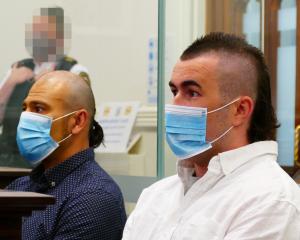
They learned details of Nicho Waipuka's violent past only when he was sentenced to 12 years and 10 months in prison in the High Court at Wellington today.
Waipuka, 20, was cleared of murder but found guilty of manslaughter by a High Court jury in December.
His co-accused Manuel Robinson, 18, was cleared of all charges.
Mr Cottrell, who had brittle bones as a result of a genetic condition, suffered a shattered skull in the attack as he walked home from work at Radio New Zealand in central Wellington early on December 10, 2011.
He died in hospital the next day.
It was revealed today that little over two weeks before the attack, Waipuka had been sentenced to intensive supervision after he punched a stranger in the head, knocking him to the ground.
Waipuka pleaded guilty to assault and was sentenced on November 22.
The judge at the time noted he should be sent to prison - but instead gave Waipuka a "last chance" by imposing a sentence of intensive supervision.
Seventeen days later, Waipuka went into town intending to "knock someone out".
He saw Mr Cottrell walking down Boulcott St, crossed the road and punched him in the head.
Waipuka then kicked or stomped on him, causing his skull to shatter and his arm to fracture, before taking Mr Cottrell's wallet and fleeing.
Justice Forrest Miller said Waipuka had 24 previous convictions dating to July 2009, including assault and threatening to kill.
"I think that you enjoy violence and that you use it casually to get what you want," he told Waipuka, who remained impassive in the dock throughout sentencing.
Mr Cottrell's brother-in-law, Heath Hollows, told reporters outside court he was angry Waipuka had been on intensive supervision at the time.
"We found that out just before we walked into the court this morning, and that was like an earthquake. It's just rocked us."
He said if the judge had made a different decision, Mr Cottrell might be alive today.
"Maybe he should have put him away and Phil would be here. People already knew what [Waipuka] was like - he was just given a chance, one too many."
Mr Cottrell's sister, Susan Hollows, said no sentence would ever be enough, but it was better than they expected.
"I feel like the jury gave two angry thugs the benefit of the doubt rather than giving justice for an innocent man. But Justice Miller has done the best for us that he possibly could in the situation, and we're really, really grateful for that.
"We were prepared for the worst, and it's actually way better than what we were expecting."
Mrs Hollows described Mr Cottrell as "one of life's gentlemen".
"He was a good, caring and thoughtful human being - highly intelligent, loved by so many people, and it's a massive loss to the world that he's gone."
In an emotional victim impact statement to the court, Mrs Hollows spoke of the "gut-wrenching horror" of seeing her blackened and bruised brother on life support in hospital.
"It was hard to tell that it was Phil lying there, his injuries were so horrific," she said.
"I will never forget how tightly he gripped my hand in those last minutes."
Mrs Hollows said the pain of her loss was physical, and had left her with stabbing pains in her stomach.
"I'm serving my own life sentence of pain and torture."
Their mother in the UK was devastated and to this day unable to leave her house due to depression.
Defence counsel Paul Paino agreed the attack had been senseless, unprovoked and violent.
But he said Waipuka had committed no serious acts of violence in the past and had offered to plead guilty to manslaughter - an offer the Crown declined.
Justice Miller said Mr Cottrell had done nothing to provoke the eight-second attack as he walked home from work.
"The attack was not only swift but also brutal. Mr Cottrell suffered terrible injuries."
He sentenced Waipuka to 12 years and 10 months in prison, with a minimum non-parole period of eight and a half years.











